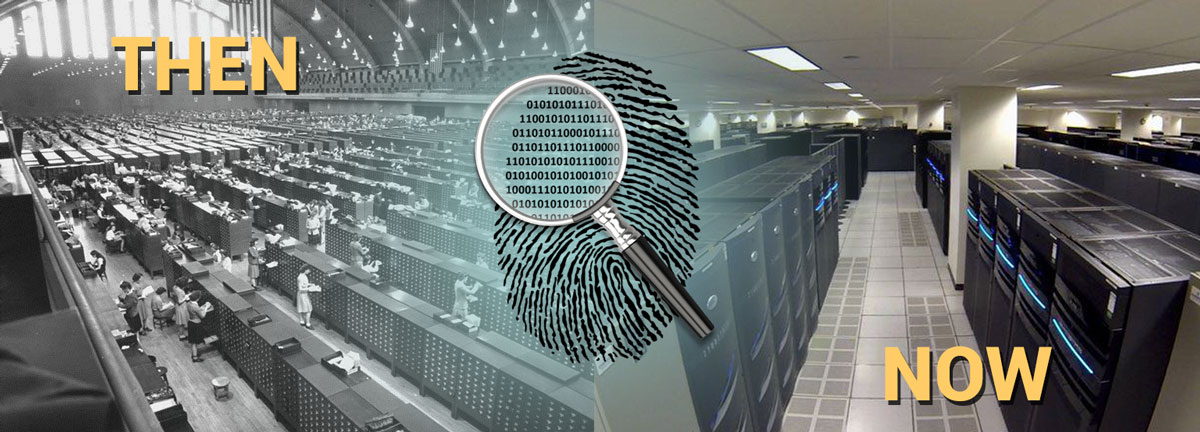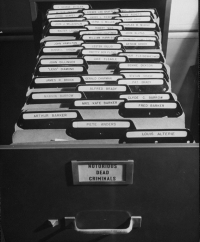Making a digital conversion isn’t just available to the FBI or other large government agencies.
Any organization can methodically improve efficiency, recapture floor space, satisfy compliance, and save money by converting its paper into digital files.
The FBI is an excelling example of reaping the rewards by moving from paper to digital files. The era of sliding drawers full of aging FBI files is over. Millions of fingerprint cards, criminal history folders, and civil identity files that once filled rows upon rows of cabinets—and expansive warehouses—are now completely digital. Fingerprint identification is one of the most well-known and publicized biometrics. Because of their uniqueness and consistency over time, fingerprints have been used for identification for over a century, more recently becoming automated due to advancements in computing capabilities.
Since 1924, the FBI is the single U.S. repository for fingerprints. At the end of 2021, the FBI’s system holds the fingerprints and criminal records of over 162 million criminal and civil individuals, according to the FBI monthly fact sheet. Notably, the system architecture is designed to enable local, state, federal, and international law enforcement communities, and civil organizations, to efficiently access or exchange critical information around the clock, 365 days a year.
Moving to Digital
The conversion from manual to digital systems began more than two decades ago, when paper files outgrew the space at FBI Headquarters in Washington, D.C. They were shipped to West Virginia, where the FBI built a campus in Clarksburg for its Criminal Justice Information Services (CJIS) Division and leased warehouse space in nearby Fairmont for the burgeoning files. In 2010, CJIS broke ground on a new Biometric Technology Center and took on the project of digitizing all the files. The effort eliminated the need to move scores of cabinets full of paper into the new technology center.
The files that comprised the bulk of the digital conversion fell within three broad categories: criminal history files dating back to the early 1970s and before; civil identity files of people born prior to 1960 who enlisted in the military or applied for a government job; and fingerprint index cards. Files are maintained until individuals are 110 years old or dead.

Historic Fingerprint Cards
After scanning and digitization, the paper files are destroyed, though original versions of historic files—fingerprint cards for John Dillinger, Bonnie Parker, and Clyde Barrow, to name a few—have been saved from the shredder.
Seeing Results
“According to Jermy Wiltz, CJIS deputy assistant director, “This is a monumental leap for us, because now we’re not taking months to get back with a positive identification.” Results are now available in seconds and sub-seconds.”
Today, all law enforcement, homeland security, and other organizations requiring absolute verification are benefiting from fingerprint digital conversion. The data center at the Criminal Justice Information Services Division in West Virginia is home to the Next Generation Identification system, or NGI.
Just like the FBI, although perhaps not on the same scale, any organization can methodically improve efficiency, recapture floor space, satisfy compliance, and save money by converting its paper into digital files. eBizDocs works with private business and public agencies to help them cross the “paper” to “less paper” chasm and become a better organization, top to bottom and side to side.
Next Steps
Let’s start a fact finding, no obligation, conversation about your goals and objectives.
Call eBizDocs today (866) 816-1217 or send an email to [email protected]
Take the next step by starting a fact finding, no obligation, conversation with eBizDocs about your goals and objectives.
About eBizDocs –eBizDocs is a premier digital transformation provider focused on helping you put INFORMATION AT YOUR FINGERTIPS. Offerings include paper and microfilm conversion, content capture and document management solutions, scanner sales and service, and process consultation. eBizDocs is SOC2 Type II certified and serves private and public-sector organizations. The company has been in business for over 20 years and is a preferred source contractor for NYS entities. To learn how eBizDocs can help transform your operation, visit eBizDocs.com.


